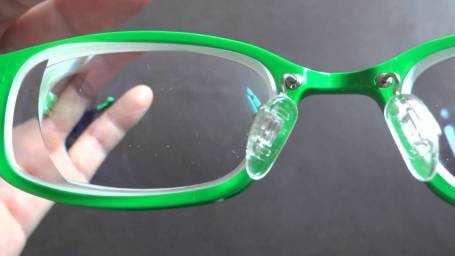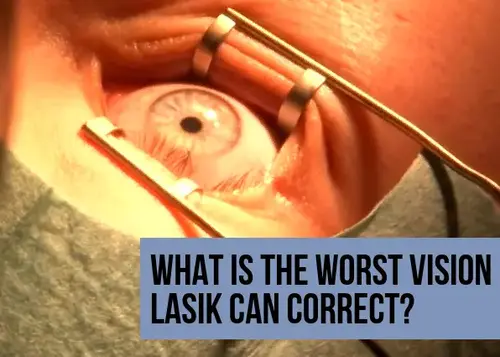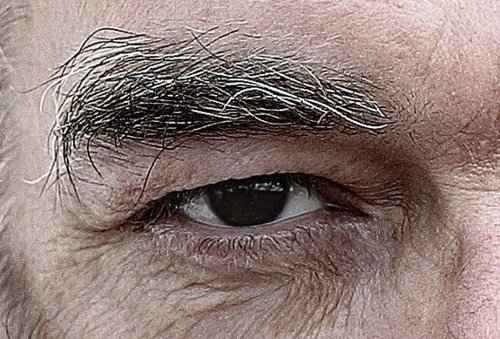Many patients have a question about how bad vision can be corrected by LASIK surgery. We will discuss this interesting question in this article.
What is the worst vision LASIK can correct? Numerous eye care patients think that they are not candidates for LASIK because they have high prescriptions. In the past, this was a genuine problem – LASIK in its early years was not well equipped to assist those with significantly restricted vision. Nevertheless, as technology has actually improved, this restriction has been overcome. With modern-day treatments, surgeons have the ability to remedy prescriptions as high as -12.00. This makes almost everybody a prospect for LASIK, even those with very high prescriptions.
What LASIK can fix

Laser LASIK eye surgery is indicated for the following vision pathologies
- Astigmatism (+/-1 to +/-4), in which a person sees an image blurred and therefore constantly squints (see also Does lasik work for astigmatism?);
- Farsightedness/hypermetropia (+1 to +6 dptr), which causes low vision at close range;
- nearsightedness / myopia (-1 to -13 dptr) is the most common refractive defect in which a person has poor far distance vision.
People usually agree to laser correction due to intolerance of glasses and contact lenses or lack of desire or possibility to wear them. For example, it is hard to imagine wearing glasses as a lifeguard or for example, a sportsman. Laser correction becomes a great opportunity for many people to do what they like in spite of their eyesight problems. LASIK surgery allows to get rid of glasses and lenses either for good or for many years to come.
See also: Can LASIK Improve Reading Vision
Are there any restrictions to LASIK surgery?

LASIK surgery is very safe and painless. But it is not accessible to everyone. There are a number of restrictions that prevent the doctor from prescribing this procedure. The list of contraindications includes relative (temporary) limitations and categorical prohibitions. Temporary contraindications are restrictions that can be rised by the doctor. They include:
- chronic infection of the eyelids and organs of vision;
- Mild to moderate degrees of “dry eye” syndrome;
- Enophthalmus (excessive retraction of the eyeball into the cavity of the eye cavity);
- lagophthalmus in a pronounced form, when eyelid incontinence is visible to the naked eye;
- diseases of the cornea, which greatly reduce its sensitivity;
- viral keratitis;
- operated retinal detachment;
- congenital cataract;
- Subcompensated glaucoma or grade 3 glaucoma, in which the eye pressure remains elevated and fluctuates during the day against the background of treatment
- Small size of the eyeball;
- a corneal diameter of less than 10 mm (the norm for an adult is 10-12 mm)
- The optical power of the cornea is less than 39 or more than 49 Dptr (the norm is 43,05 Dptr);
- corneal dystrophy;
- Very thin cornea (thickness less than 400-450 microns);
- Severe deterioration of vision in the last few months.
See also: How Is Laser Eye Surgery Done
Eye Surgery for Bad Vision
In reality, patients with severe vision issues are often the best candidates for LASIK. For some conditions, especially astigmatism, LASIK can in fact fix the issue much better than any contacts or glasses. Patients with severe astigmatism will usually have much better vision after LASIK than they did with corrective lenses before their procedures.

In addition, the inconveniences of bad vision are the worst for those with high prescriptions, so the enhancement of LASIK is even higher. These patients typically have to use special glasses or contacts. Not all models of glasses, especially prescription sunglasses, are available for the greatest prescriptions.
While a person with moderate vision might be able to navigate without their glasses sometimes, the high-prescription patient is incredibly dependent on corrective lenses. For this kind of patient, the LASIK procedure is incredibly releasing and empowering.
If you have a high prescription, you may still be a prospect for LASIK. Even if you’ve been informed before that your prescription was too expensive, come in for a free consultation. With the current innovation, you are most likely a fantastic prospect!
Read also: Can You Go Blind From LASIK Surgery?



